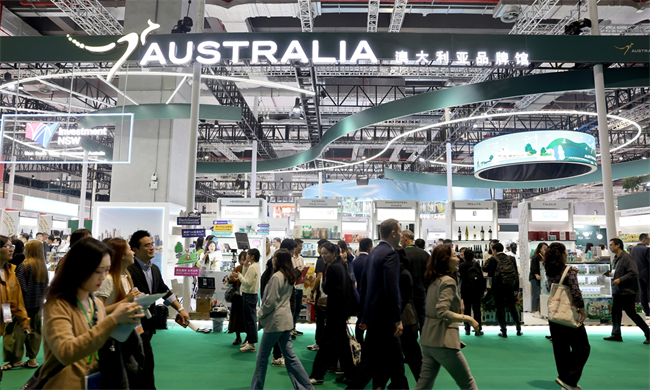
The Australia pavilion at the 8th China International Import Expo (CIIE) Photo: Chen Xia/GT
The Chinese market remains foundational for Australian businesses, not only for its scale and sophistication, but also for its growing role in driving global trends in sustainability, innovation and consumer preferences, Vaughn Barber, chairperson of the China-Australia Chamber of Commerce (AustCham China), told the Global Times in an exclusive interview on Wednesday.
The remarks came as China's annual trade fair, the China International Import Expo (CIIE), is being held in Shanghai from Wednesday to November 10, attracting government and business delegations from around the world, including Australia, that are eager to seize opportunities in China's open market.
The CIIE, which is holding its eighth session this year, has drawn a delegation of 256 Australian companies, led by Australia's Trade Minister Don Farrell, marking the largest Australian presence at the event so far.
The CIIE continues to be a key platform for Australian businesses to showcase world-class products to their largest export market, said Barber. This year, a record number of Australian businesses are participating, seeking new opportunities to expand and diversify within the Chinese market, across regions, sales channels and customer segments, he said.
Exhibitors will showcase a broad range of in-demand food and agriculture products — packaged foods, dairy, meat, seafood, wine and beverages — alongside healthcare and consumer goods.
"These are categories where Australian quality, provenance, and reliability resonate strongly with Chinese consumers," said the chamber head.
To Barber, this annual trade fair "provides a unique opportunity to connect directly with distributors, corporate buyers and consumers from across China, and even from other international markets represented at the Expo."
"For many exhibitors, it's a chance not only to grow sales, but to test new products, build relationships, and demonstrate a long-term commitment to the China market. The Expo remains a powerful symbol of the continuing interest and confidence on both sides to deepen Australia-China commercial engagement," he said.
In a recent Doing Business in China report issued by AustCham China, the organization noted that while companies were navigating a more complex environment, most continued to see China as indispensable to their long-term strategy. The findings of the chamber's upcoming 2025 Doing Business in China Flash Report, to be released during the CIIE, will reaffirm that view, according to Barber.
Ultimately, China's significance lies not just in its size, but in its dynamism and openness to collaboration, said Barber, noting that it is a market to learn from as well as sell into.
"For businesses that engage with a long-term, strategic mindset, China will remain a cornerstone of their growth and of Australia's broader international competitiveness," he noted.
According to the upcoming 2025 Doing Business in China Flash Report, which surveyed more than 700 companies engaged in Australia-China business, traditional sectors such as resources, energy and agriculture remain the backbone of the bilateral trade relationship.
At the same time, the report highlights a clear shift in perceptions of opportunity for the next five years toward food and agriculture, with opportunities to lift efficiency and scale across supply chains, from on-farm productivity and processing to cold-chain operations, safety systems, traceability, and e-commerce, and toward broader growth areas including clean energy, advanced manufacturing, healthcare and digital trade.
"These are sectors where complementary strengths can create new capability together," said Barber.
The nature of the complementarity is changing, said Barber, noting that "as China's economy continues to innovate and expand its technological and industrial capabilities, the opportunity lies not only in what Australia can supply to China, but in what we can build together."
This next phase is about joint capability, combining Chinese technology, expertise, and scale with Australian innovation, resources, and trusted governance to unlock growth in agri-food, clean energy, healthcare, and advanced manufacturing, said Barber.
Also at the CIIE, Penfolds Managing Director Tom King is excited about being part of this year's annual fair, which marks Penfolds' sixth year of participation. King told the Global Times that "visitors can enjoy an immersive luxury tasting experience and discover our limited-edition Year of the Horse gift box" at this year's expo.
"The CIIE provides an important platform for us to engage with China's growing community of wine enthusiasts, strengthen local partnerships, and demonstrate our ongoing commitment to the Chinese market through initiatives such as the Australia-China Winemaker Immersion Program and our collaboration with China Agricultural University," King said.
Commenting on the importance of the Chinese market for the Australian wine brand, King said that "China has been integral to Penfolds since our first export to Shanghai in 1893, and it remains one of our key markets."
With its recent investment in a winery in Northwest China's Ningxia Hui Autonomous Region, the company is deepening its presence and confidence in China as a future origin of globally recognized luxury wines, said King. Penfolds sees strong momentum driven by growing demand for premium wines, and its focus remains on local collaboration, sustainability, and contributing to the long-term growth of China's wine industry.
"China is Australia's largest trading partner - larger than our next three combined, with businesses and jobs across Australia supported by our relationship," according to a press release posted on the website of the Australian Embassy to China, citing Farrell.
"The record number of Australian businesses traveling to the expo means our world class agricultural, industrial and services exports are on show and ready to meet Chinese demand," Farrell said.
On Tuesday, Chinese Minister of Commerce Wang Wentao met with Farrell in Shanghai. Wang said that under the current circumstances, China and Australia should strengthen collaboration within regional and multilateral frameworks, jointly safeguard the WTO-centered, rules-based multilateral trading system and inject greater stability and certainty into the global economy.
Source: People's Daily Online








